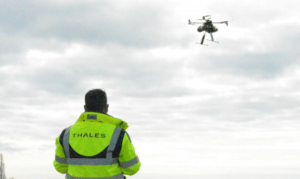
French tech company Thales, Drones-Center and ZenT have teamed up to demo a hydrogen-powered drone.
Organized to test industrial and operational feasibility, the demonstration is another in a growing number of drone projects using hydrogen cells to extend flight time.
“Drones used in professional applications need to combine operational efficiency with the highest levels of flight safety, with their range capabilities and endurance as key criteria,” a Thales spokesperson noted.
“Various propulsion technologies already meet these criteria, but hydrogen fuel cells are a particularly effective way to increase the drone’s endurance due to the low mass and high energy density of hydrogen.”
During the test, the drone reached the capacity to fly up to two hours without recharge with a cell refuel time of no longer than a minute.
“Hydrogen drone technology opens up new opportunities in applications such as surveillance of sensitive sites and military facilities. Equipped with ScaleFlyt operational safety technologies and integrated into Thales’s Security Digital Platform, hydrogen drones will be able to conduct complete missions drawing on high-reliability, affordable, easily deployable solutions,” said Emmanuel Guyonnet, Drone programme director, Flight Avionics, Thales.
Researchers say hydrogen drones could someday reach flight times of at least three hours while carrying payloads up 6.6 pounds, covering about 90 percent of all site surveillance and inspection use cases.
A Thales press releases adds:
“For the demonstration flight, the ScaleFlyt Geocaging solution was installed on the drone to ensure regulatory compliance. This Thales solution combines expertise in robotics, security technologies and certified avionics systems to deliver highly reliable flight containment capabilities for drone operations. Developed with support from the French civil aviation authority (DGAC), ScaleFlyt Geocaging guarantees that the drone remains in a designated area throughout the flight.”
Hydrogen drones take flight
In April, South Korean drone company Doosan Mobility Innovation (DMI) inked an agreement with Dutch government agency NHN (Development Agency Noord-Holland Noord, NHN) to test hydrogen drones offshore solutions including delivery, marine monitoring, and search and rescue. In 2020, public-safety drone consultancy Skyfire Consulting announced a partnership with Doosan and hydrogen-fuel service provider ReadyH2 to tackle a pipeline-inspection project for an unnamed American company. Doosan deploys a hydrogen-powered octocopter with a hydrogen-powered generator fueling two hours of flight time per mission over nearly 50 miles.
UAV-services provider Robotic Skies last year joined forces with UK fuel-cell startup Intelligent Energy to offer expanded, post-sale support for drone fuel cells. Intelligent Energy manufactures very light, power-dense hydrogen fuel cells used for many drone applications, especially projects requiring longer flight times, like drone delivery.
Jason is a longstanding contributor to DroneLife with an avid interest in all things tech. He focuses on anti-drone technologies and the public safety sector; police, fire, and search and rescue.
Beginning his career as a journalist in 1996, Jason has since written and edited thousands of engaging news articles, blog posts, press releases and online content.
Email Jason
TWITTER:@JasonPReagan
Subscribe to DroneLife here.







[…] has joined METIP and has signed an agreement with METIP and DroneQ Robotics to jointly investigate potential applications for hydrogen drones through testing, demonstrating and validating use cases and pilots in the maritime and offshore […]